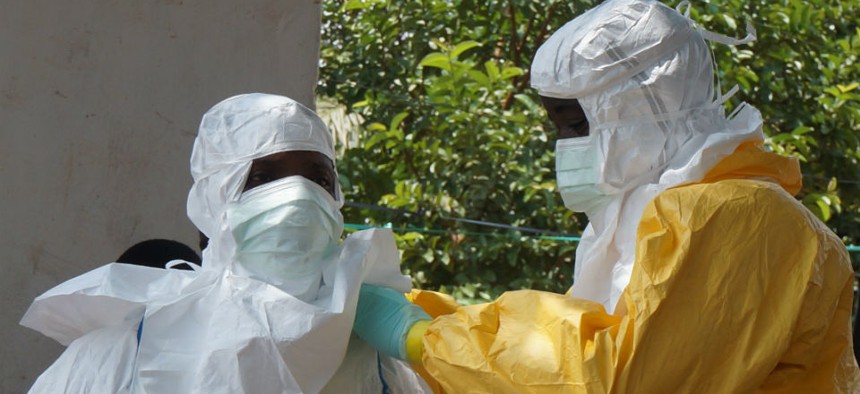
Transmission rate remains high in Sierra Leone. Flickr user Cyprien Fabre/European Commission DG ECHO
Why It's Too Early to Forget About Ebola
The Ebola outbreak is far from over in West Africa. Pay attention, America.
Americans are googling Taylor Swift more than they're googling Ebola.
The panic that gripped the country following four diagnoses of the virus in the United States seems to have faded into a collective amnesia following a three-week period with no new Ebola cases.
But the out-of-sight, out-of-mind approach ignores the crisis that continues to plague West Africa. Funding for the international response has lagged, and positive developments in Liberia have resulted in premature optimism about a situation that we still don't fully have a grasp on. Health experts have said all along that the only way to eliminate the risk of infection in the U.S. is to end the outbreak there—and we're still far, far away from the finish line.
"The Ebola focus we had over the past month really has been largely on that in the U.S.; many of us kept saying, 'Don't take the eye off the ball in West Africa,' " said Michael Osterholm, director of the Center for Infectious Disease Research and Policy at the University of Minnesota. "[But] the interest and concern has focused on a few cases in the U.S. This is not surprising—people think, 'Am I going to contract Ebola? If it's over there, it's not my problem.'"
The risk of contracting Ebola in the U.S. has always been negligible, but that doesn't mean Americans shouldn't be concerned. Instead, health experts are imploring the public to direct concern toward the crisis in West Africa, worried that complacency could set back any gains in in controlling the epidemic and thus put West Africa and the U.S. at greater risk.
"We can't confuse this as a humanitarian effort only; it's also in our self-interest," Osterholm continued. "As long as the infectious disease forest fire is going on there, we're going to have embers flying around the world."
The release last week of Dr. Craig Spencer, who contracted Ebola while treating patients in Guinea and was diagnosed in New York City, brought the number of U.S. cases down to zero. Of the ten people treated for Ebola in the U.S. thus far, all eight Americans have survived. The other two individuals tragically lost their lives: Thomas Eric Duncan, who traveled to Dallas from Liberia, died on Oct. 8; while Dr. Martin Salia, a surgeon from Sierra Leone who was brought to the U.S. for treatment, passed away Monday morning.
There have been more than 14,000 reported cases and 5,160 deaths in the Ebola outbreak in Liberia, Sierra Leone, and Guinea, according to new data from the World Health Organization.
White House Ebola 'Czar' Ron Klain called Spencer's recovery a "milestone," but warned, "We will see other cases of Ebola in the United States."
"We are not at the beginning of the end or even the end of the beginning, but we are at the throes of this effort in West Africa with interventions that can work," Klain said Thursday.
The Obama administration's focus on the outbreak has only deepened, as the public's attention has waned. The White House has asked Congress for nearly $6.2 billion in both immediate and contingency funding to fight the epidemic in West Africa, ramp up preparedness in the U.S., and prevent future outbreaks.
"What we are seeing is cases moving … to other regions in the country," said Health and Human Services Secretary Sylvia Mathews Burwell. "We very quickly need to get to those areas and do the process again."
Recent WHO and CDC reports show that cases appear to be declining in Liberia, but the rate of transmission of the virus remains high in Sierra Leone and Guinea. A handful of cases have also cropped up in Mali, and travellers from the country will face enhanced screenings upon their arrival at U.S. airports, the CDC said Sunday.
"There's been some confusion over the past two weeks, with WHO saying cases are leveling off in Liberia," Osterholm said. "There's this idea that we're done. It's very premature to suggest that. We've seen a fireworks transmission—a big burst of cases and then it goes dark. Some NGOs have taken down treatment centers and moved them because those areas were no longer 'hot.' Then they turned hot again."
Relief organizations like Doctors Without Borders are trying to temper optimism, saying it's too early to scale back response efforts. Yet the public's engagement remains low.
Doctors Without Borders has received $96.4 million globally in funding for its Ebola response, $18.2 million of which were U.S. donations, according to spokesperson Tim Shenk. The organization raised $138 million globally for its response to the Haiti earthquake.
The American Red Cross has received $3.7 million in donations for Ebola relief, $2.9 million of which came from the Paul G. Allen Foundation, according to Jana Sweeny, the director of international communications. This is compared with $486 million in donations for the 2010 earthquake in Haiti, and $87 million for Typhoon Haiyan in the Philippines last year. Sweeny said the organization saw a small jump in donations around diagnosis of the first U.S. case.
Internet searches for "Ebola" have also spiked at each U.S. diagnosis, then plummeted. The number is currently at its lowest point since before the first U.S. case was diagnosed—a negligible interest level on par with this spring and summer, when most Americans were largely unaware of the Ebola outbreak that has been ravaging West Africa since March.
Google itself has jumped in to boost fundraising. Last week the company included a banner at the top of its homepage for all U.S. users to donate, and pledged to give $2 for every $1 donated until $7.5 million total is raised. Facebook, too, put a "donate" button at the top of user profiles.
The banners served also as a reminder to their millions of users about the crisis continuing in West Africa. But several days after the campaign began, Google has met its total goal of $7.5 million, and the donation banners were promptly removed from the site.
"My frustration is the big picture. People care now because Ebola is in the news and came to the U.S., but Liberia and Sierra Leone were devastated by civil war before and are going to need so much help," said Emily Bell, marketing and development manager at More Than Me, a nonprofit dedicated to providing education and opportunity for girls in the West Point slum in Liberia, which has worked to combat Ebola since the outbreak began.
"I worry that's going to die out in a couple weeks and months, and no one will care about Liberia again," Bell told me. That was a few weeks ago.
(Flickr user Cyprien Fabre/European Commission DG ECHO)







